Is your healthcare company struggling to attract patients online? In today’s competitive field, medical professionals need a strong online presence to succeed.
However, mastering healthcare SEO efforts can feel like performing surgery in the dark – complex and risky.
This guide sheds light on the process, showing healthcare companies how to climb search engine rankings and connect with those who need their services.
Let’s show you how.
Why use SEO for healthcare services?

In the crowded healthcare industry, getting noticed by potential patients is key. Healthcare services are in high demand, but how do people find the right provider?
Through a website, sure. But what makes that website stand out?
Search engine optimization (SEO) ensures your healthcare practice appears high in search engine rankings when people look for medical services in your area.
A strong online presence is essential for any modern healthcare organization. Consider these stats:
- 75% of patients factor in a healthcare provider’s website design when making decisions.
- A substantial 90% of patients use online reviews to evaluate healthcare professionals.
SEO for healthcare builds trust, attracts patients, and grows your healthcare business. By improving search rankings, you increase online visibility and reach more people seeking the healthcare services you offer. This translates to more calls, appointments, and a thriving practice for you.
Pro Tip:
SEO efforts can be complex, requiring specialized knowledge and constant adaptation to algorithm changes. Partnering with an experienced digital marketing agency specializing in healthcare SEO can save you time and frustration while maximizing your results.
How do you create a healthcare SEO strategy?

Building an effective SEO strategy for healthcare means focusing on key elements that drive search rankings and visibility. By concentrating on the right keywords, developing strong backlinks, and optimizing local search tools, you can ensure that patients can easily find your services online.
Look for healthcare keywords

You’ve poured your heart and soul into building a successful medical practice. You’ve earned a reputation for excellence.
But in today’s digital age, even the best doctors need to be found. Patients turn to search engines to find healthcare providers.
Keyword optimization ensures your website appears in those essential search results. By understanding how search engine users look for medical topics online, you can shape your website content to attract the right target audience and climb those SEO rankings.
Understanding Keyword Research
Think of relevant keywords as the connection between your practice and potential patients. When someone types “best cardiologist near me” or “treatment for arthritis,” search engines work to provide the most relevant results. Your website needs to match these healthcare searches.
It’s a complex SEO jigsaw, but essentially has three components:
- Primary keyword: This is the main term you want to rank for (e.g., “dermatologist”).
- Long-tail keywords: These are longer, more specific phrases (e.g., “pediatric dermatologist specializing in eczema”).
- Search intent: Why is someone searching? Are they looking for information, a specific service, or a provider near them?
Tools and Tactics
KWFinder and Ahrefs are powerful platforms we use daily at Nomadic Advertising that can help you uncover valuable keywords, analyze their search intent, and see how your medical competitors are ranking.
Example 1
Let’s look at a KWFinder example – here we wanted to see how easy it would be to rank for: “Best optometrist for dry eye treatment in Midtown Toronto”
We would recommend an eyecare client go for this longtail – but still lucrative – keyword:
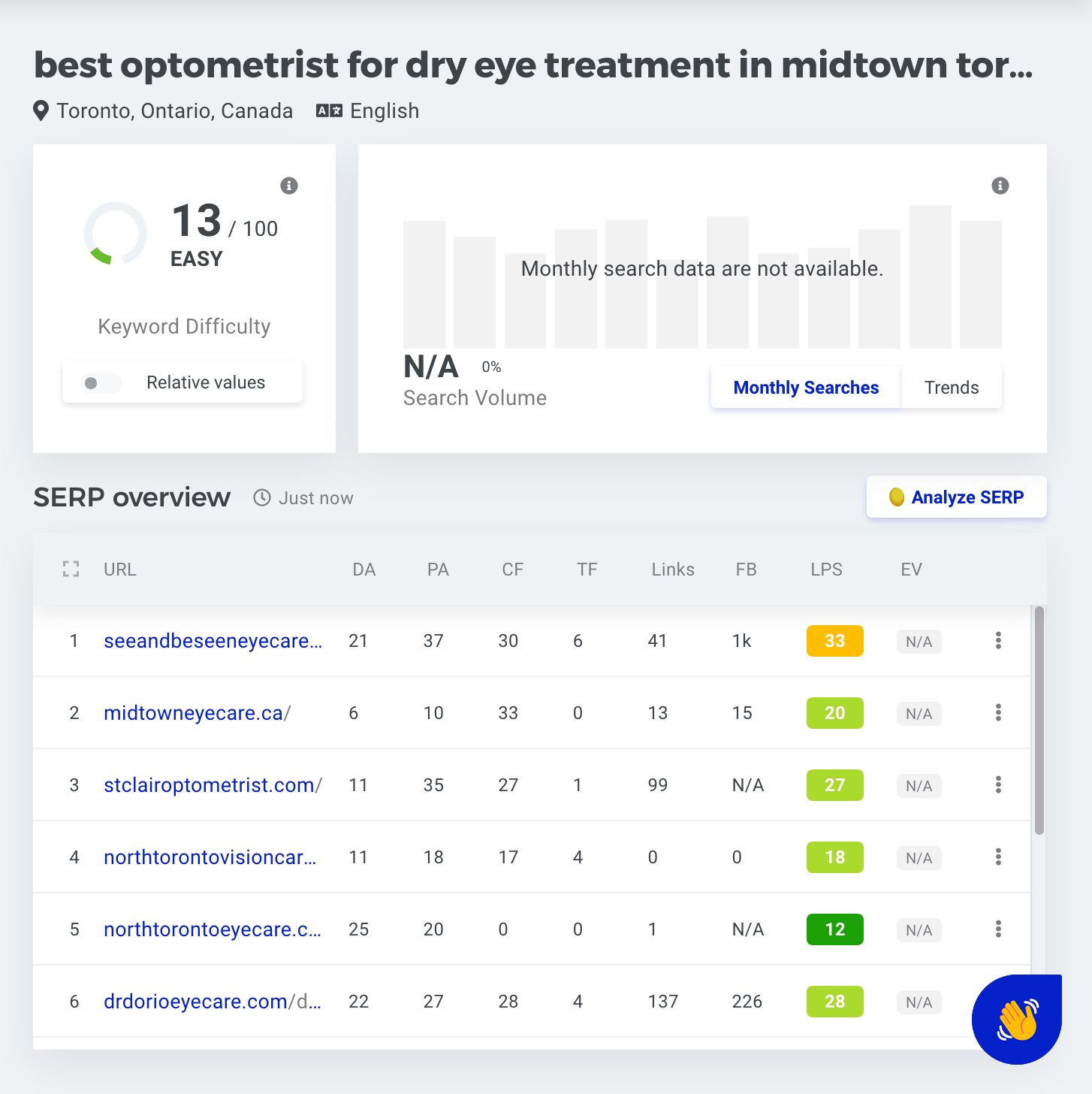
Example 2:
Next, let’s go a little broader with some research on the keyword “Lasik surgery cost in Toronto”
Again, we see that – with the right SEO strategy behind it – this is a keyword we could recommend to a client.
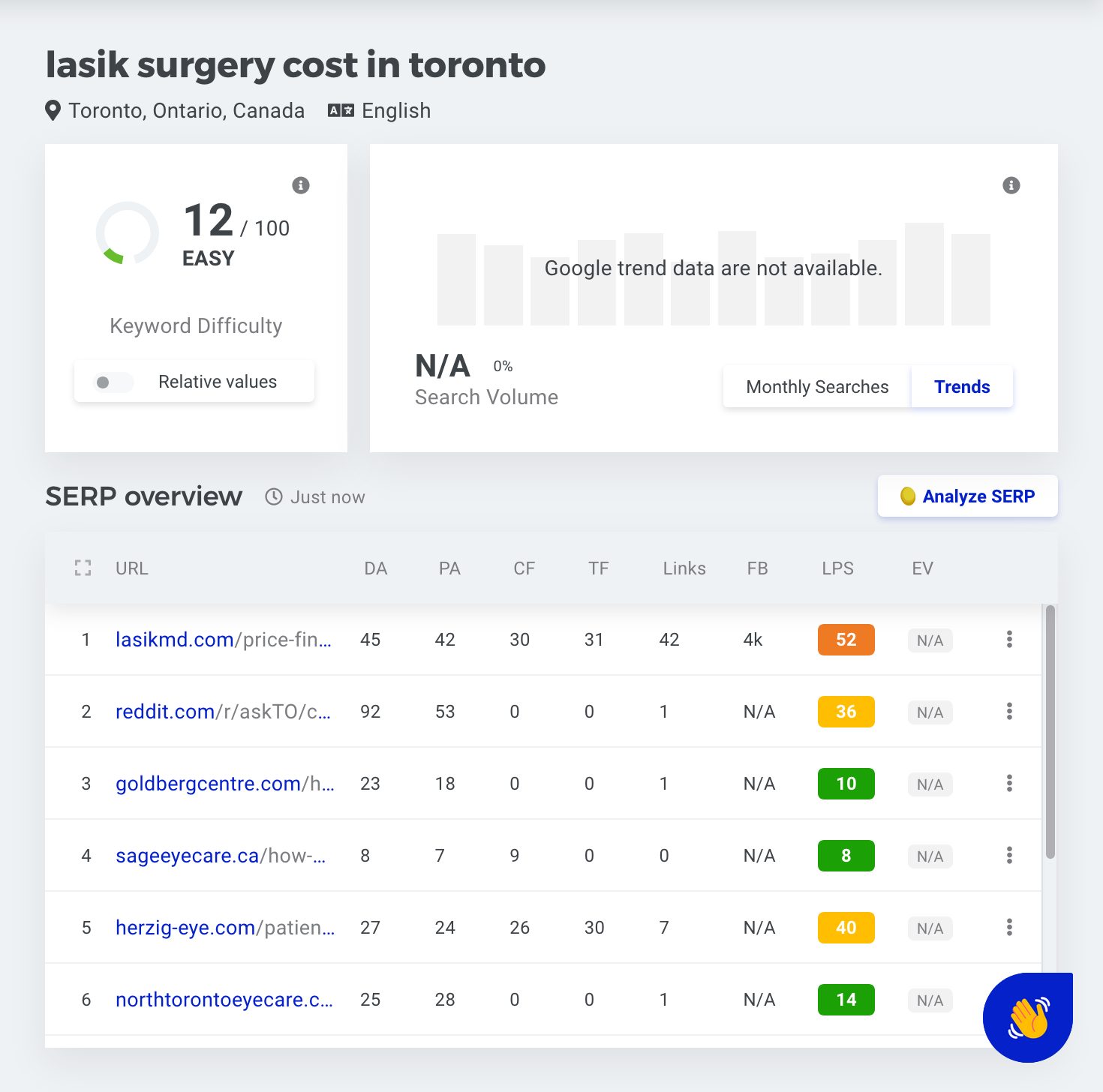
Example 3
Let’s switch to another strong tool we use a lot for keyword research: Ahrefs.
For this one, we wanted to see what kind of volume and difficulty there was in the “Eyecare in Canada” keywords:
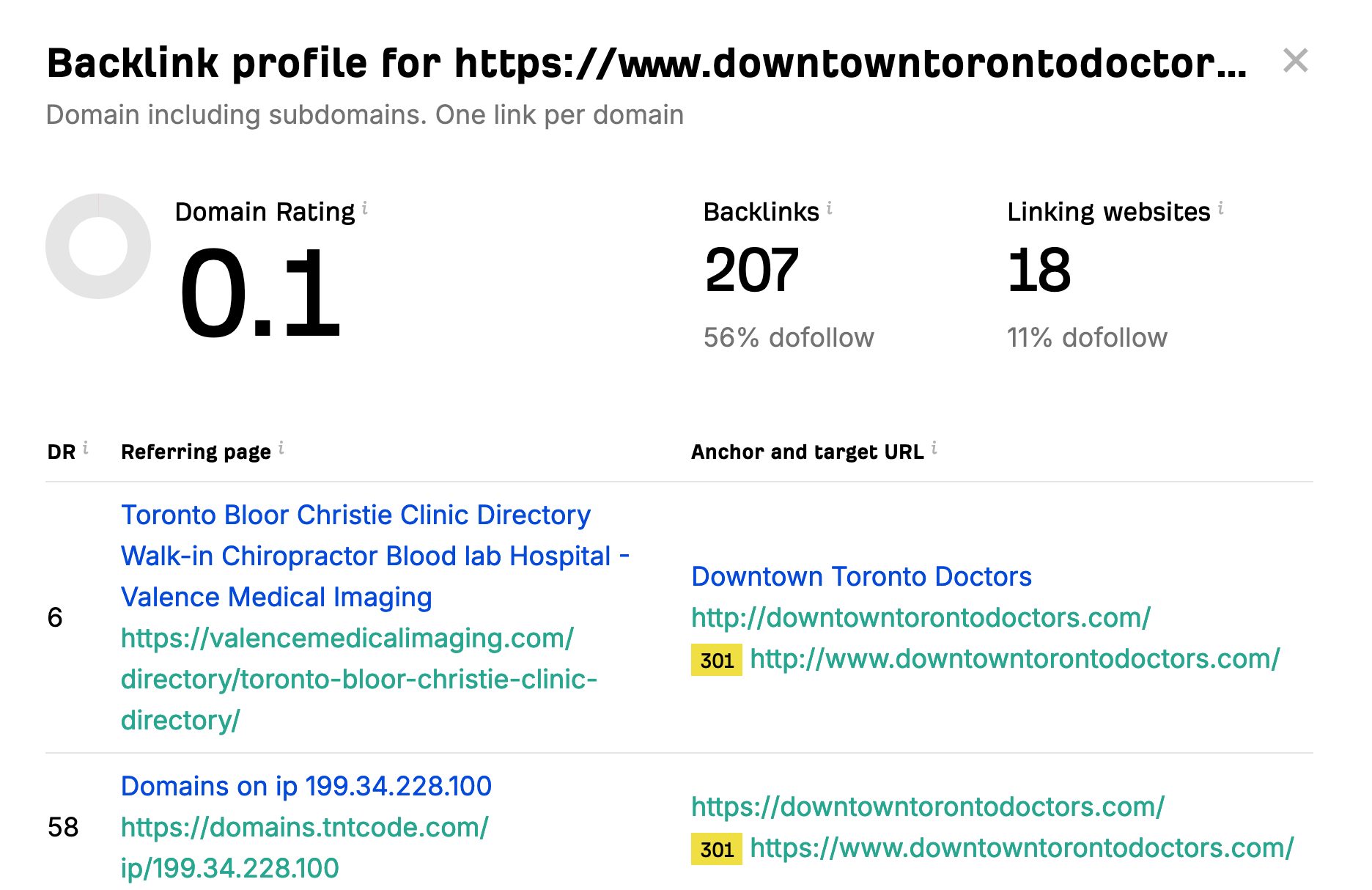
Example 4
And for the final one, we – again – used Ahrefs, switched to the Dental industry, and found some useful question-type keywords:
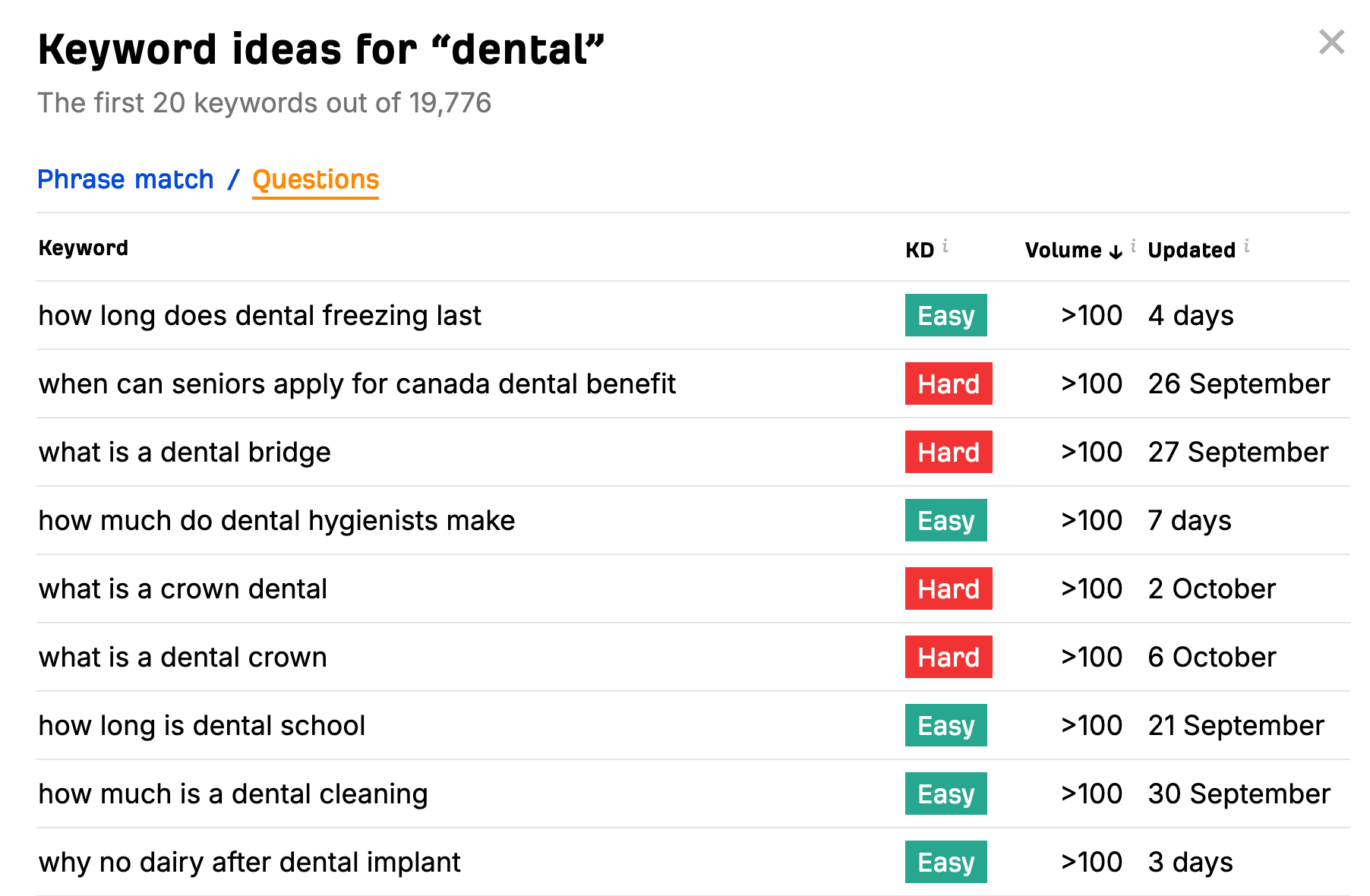
By understanding and using these premium search tools, you can refine your digital marketing strategy and gain a competitive edge.
Data-Driven Decisions
Over 70% of all search queries are for long-tail keywords. These longer, more specific phrases often have higher conversion rates than generic keywords. And – as we’ve seen with the examples above – there are plenty of them still left that you can rank for.
By conducting thorough keyword research, you can strategically target the terms your ideal patients are using. This not only improves your search rankings but also ensures that when your website appears, it’s speaking directly to the needs of those most likely to become new patients.
Link building for healthcare
Now that you’ve identified those important keywords, it’s time to build authority and strengthen your website’s position through strategic link-building.
In the competitive healthcare space, links act as referrals, vouching for your credibility and expertise.
For medical practitioners like you, a strong Backlink Profile can significantly impact your online visibility and attract prospective patients.
Here’s how to create a network of high-quality backlinks – that will not only keep search engine algorithms happy – but also drive valuable traffic to your healthcare website:
1 – Niche Directories:
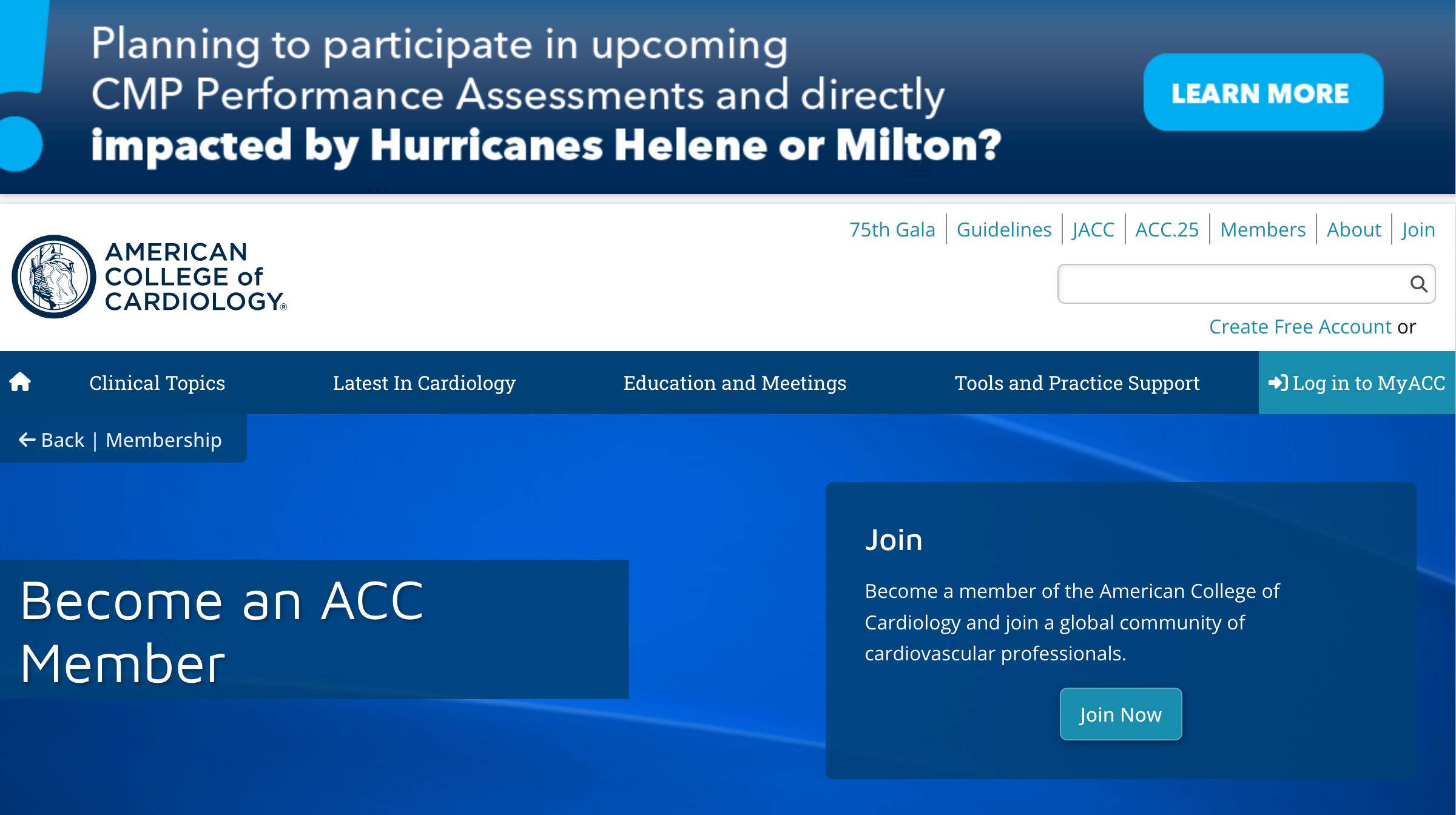
(Source)
There are strong, general directories you need to be a part of, like: Healthgrades, Vitals, and Zocdoc.
But we recommend you also seek listings in platforms specific to your area of expertise. A cardiologist, for instance, might consider the American College of Cardiology for increased visibility among peers and potential patients.
2 – High-Authority Backlinks:
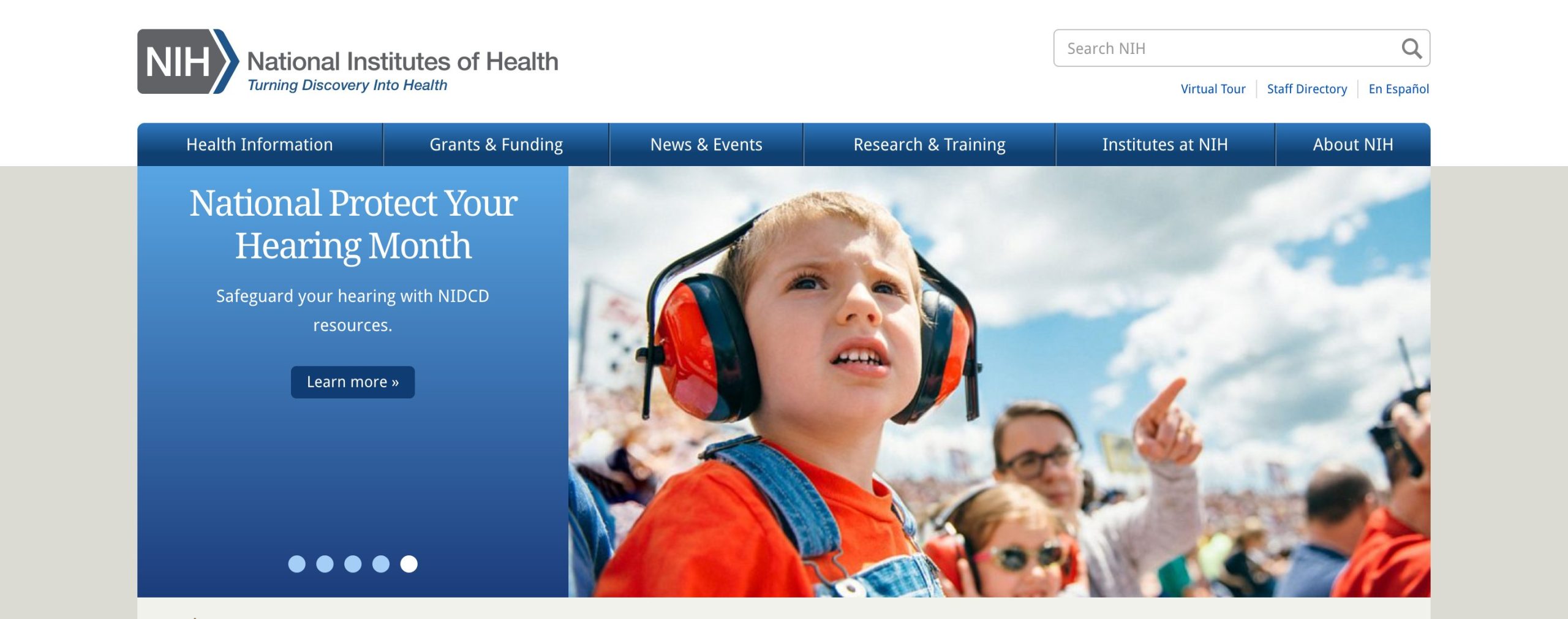
(Source)
Forge partnerships with universities or health organizations to collaborate on research projects or community health initiatives. This can lead to valuable backlinks from .edu and .gov domains, like the National Institutes of Health significantly increasing your website’s authority.
3 – Healthcare Bloggers:
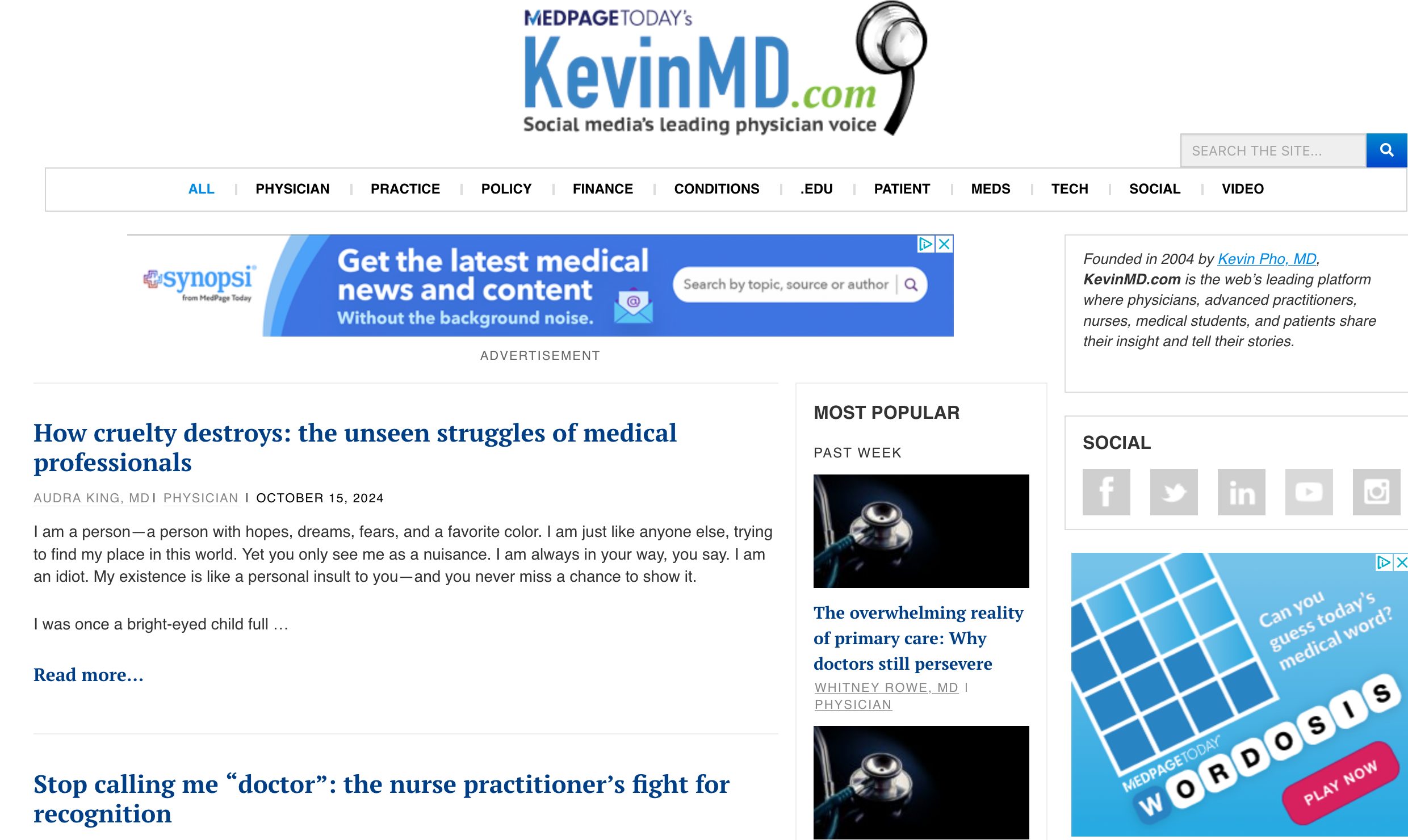
(Source)
Connect with influential healthcare bloggers and offer to contribute guest posts or provide expert commentary in exchange for a backlink. You could – for example – identify relevant blogs like KevinMD.com to reach a wider audience and establish your presence within the online healthcare community.
4 – Professional Organizations:
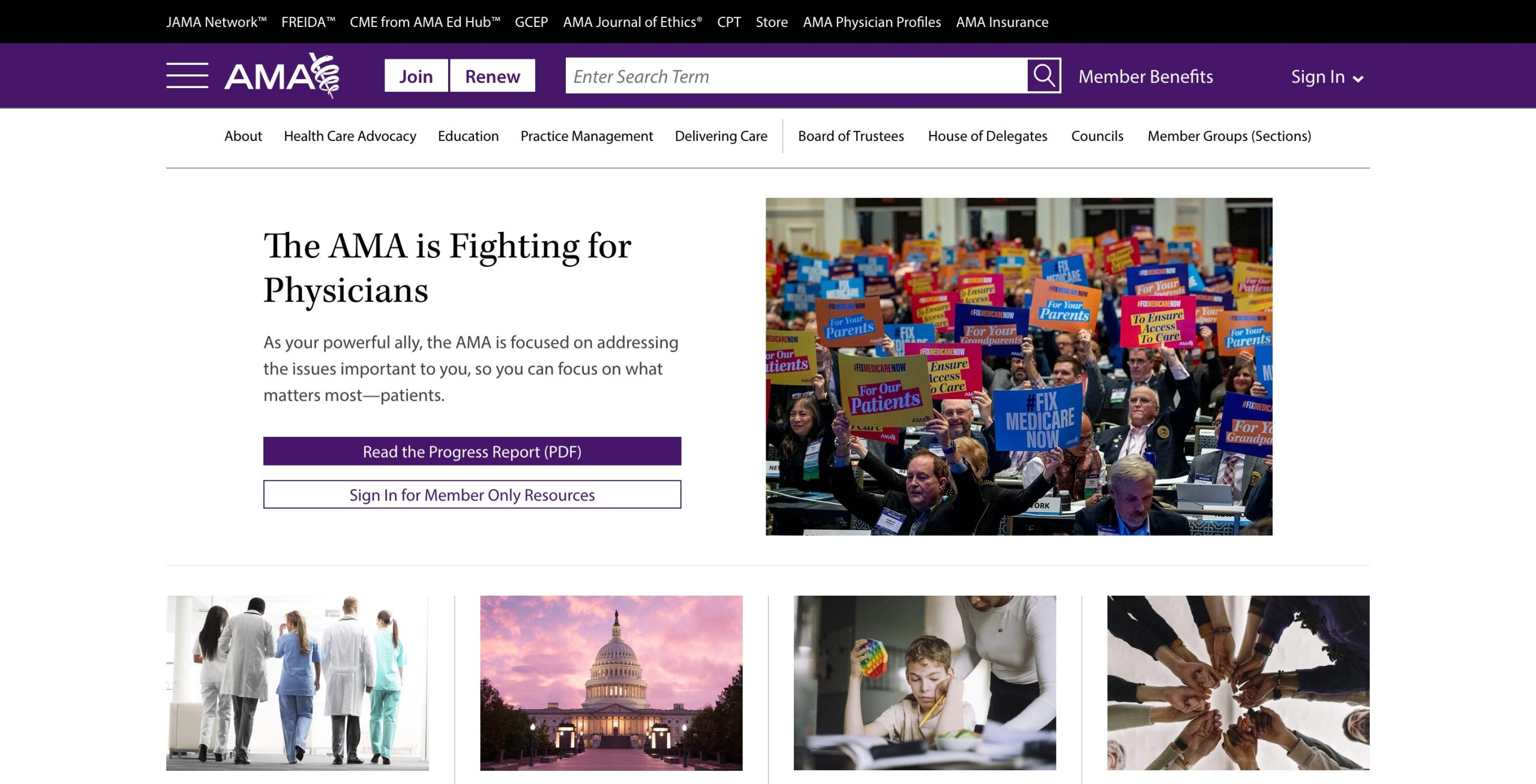
(Source)
Become an active member of reputable medical associations, such as the American Medical Association (AMA), and contribute articles or case studies to their publications. This not only strengthens your professional network but also provides opportunities to earn high-quality backlinks from authoritative sources.
5 – Guest Posting:
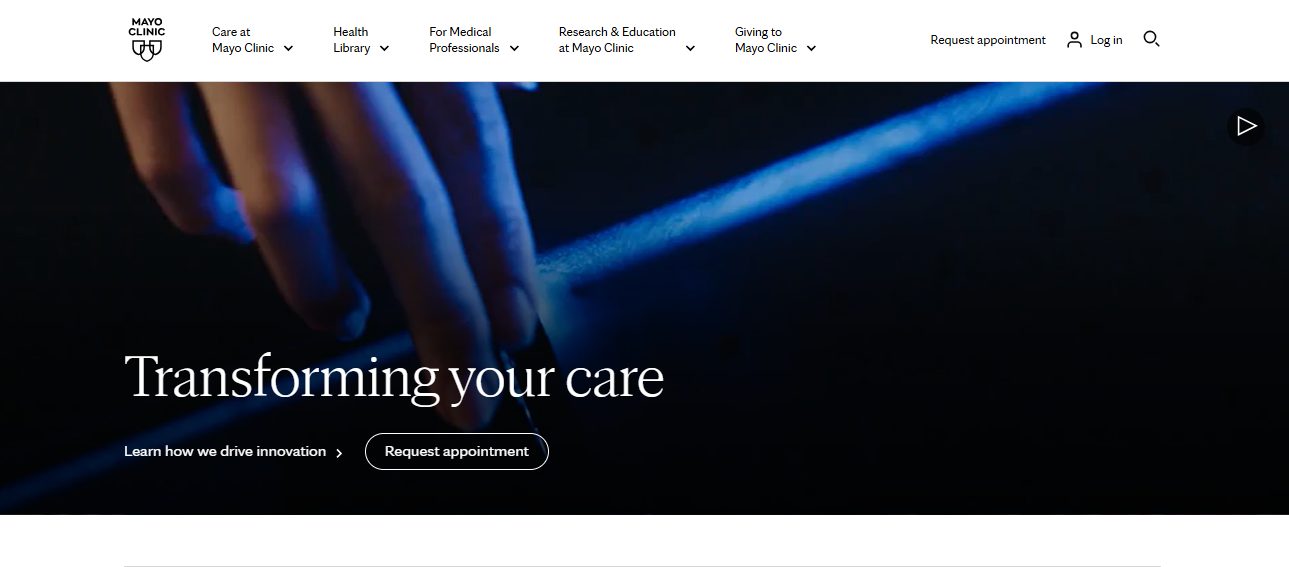
Share your expertise and insights by publishing guest articles on trusted healthcare websites and blogs like Mayo Clinic. Target highly respected publications that focus on relevant medical topics to reach a wider audience and improve your site’s Backlink Profile.
6 – Nonprofits and Health Campaigns:
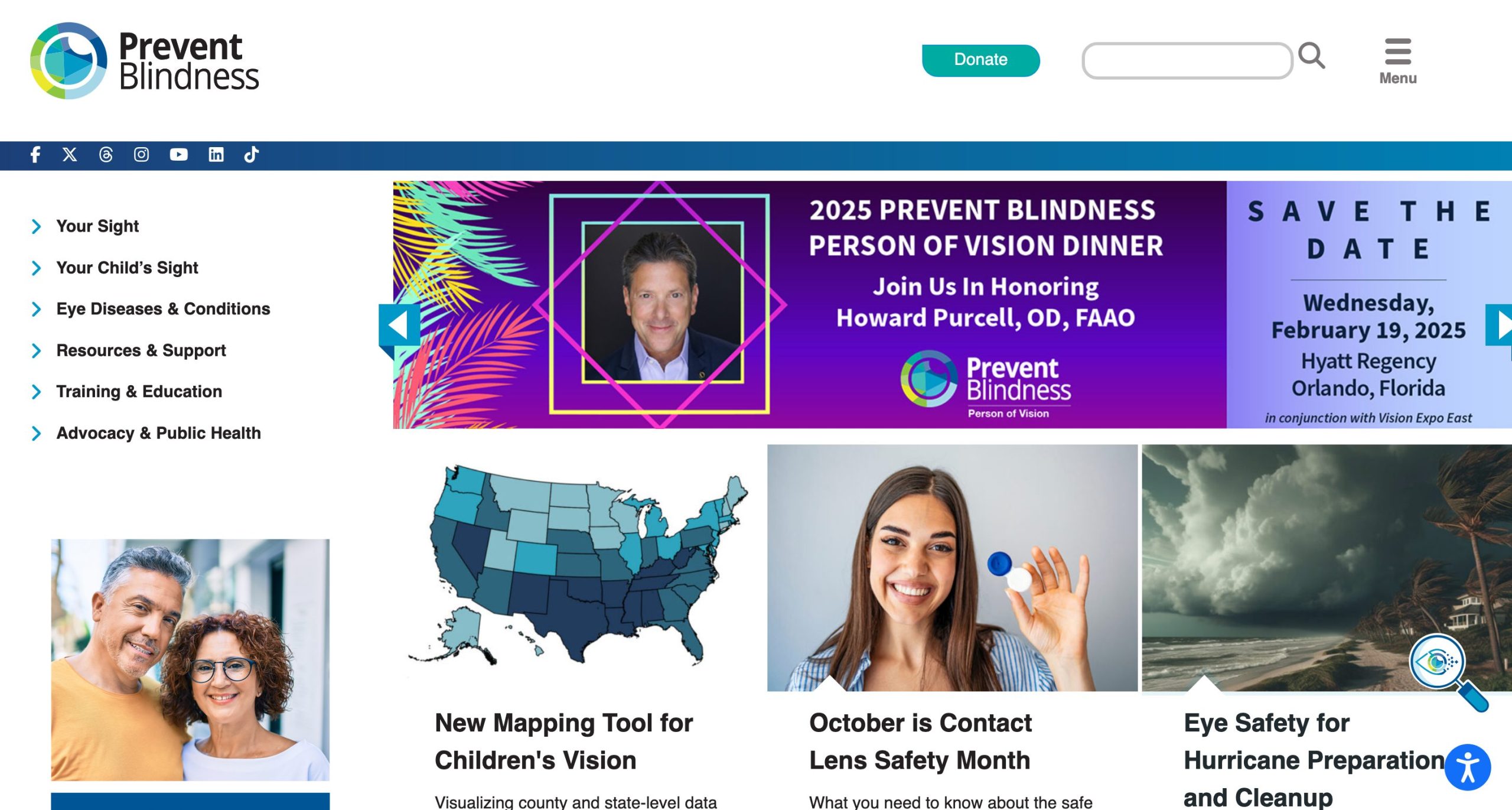
(Source)
Partner with health-related nonprofits or sponsor community health events to generate mentions and links from their websites. This not only increases your visibility within the community but also demonstrates your commitment to public health.
For example:
If you own an eyecare company could collaborate with Prevent Blindness on initiatives to provide free eye exams to underserved communities. This generates positive PR and backlinks from Prevent Blindness’s website and potentially local news outlets covering the event.
7 – Multilingual Link Building:
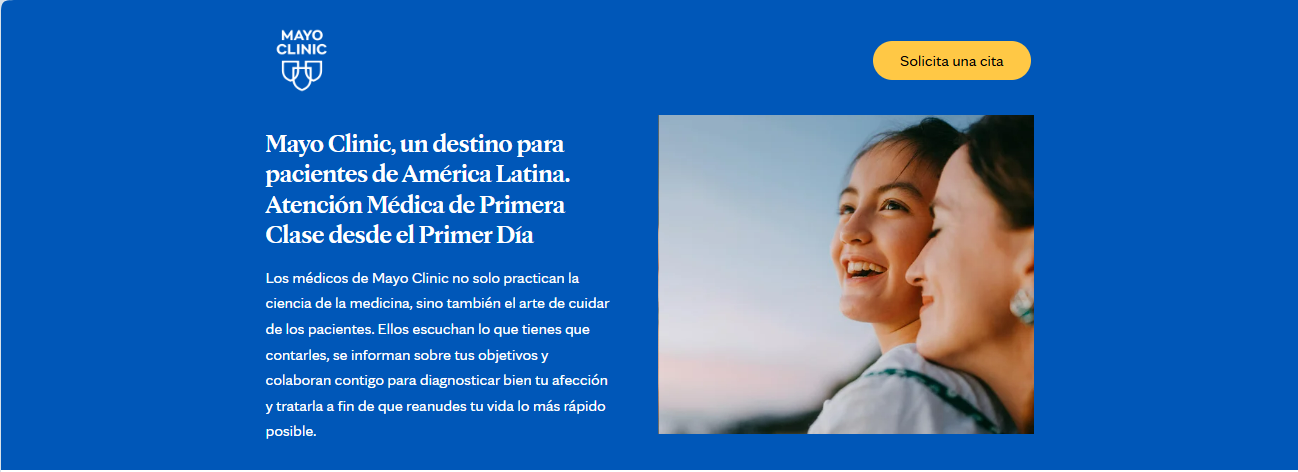
(Source)
Expand your reach and cater to diverse communities by creating content in multiple languages. Follow the example of the Mayo Clinic, which successfully increased its Spanish-language content’s visibility by acquiring backlinks from Spanish-speaking medical websites.
More Actionable Backlink Insights:
-
Analyze Competitor Backlinks: Use tools like Ahrefs to analyze the backlink profiles of your competitors. This can reveal valuable link-building opportunities that you may have overlooked.
-
Broken Link Building: Identify broken links on relevant healthcare websites and offer your content as a replacement. This provides value to the website owner while earning you a valuable backlink.
-
Monitor Your Backlink Profile: Regularly audit your backlink profile using tools like Google Search Console to identify and disavow any low-quality or spammy links that could negatively impact your website’s authority.
Google My Business for healthcare facilities
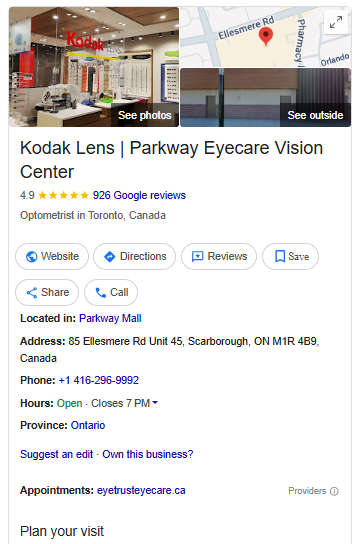
Think of your Google My Business profile as your online waiting room. It’s often the first impression people have of your practice. Is it welcoming? Does it have the information people need?
Let’s make sure it’s doing its job. Here’s our step-by-step guide:
1 – Claim Your Listing
Start by claiming your Google My Business listing on google.com/business. It’s a quick process. Verify ownership through a postcard, phone call, email, or instant verification.
Do you have multiple doctors at your clinic? Consider giving each one their own listing under the main facility’s profile.
2 – Keep Your Details Up-to-Date
It’s easy to overlook the basics, but keeping your GMB profile accurate is vital. Think about it – a patient arriving at an old address or calling a disconnected number is not a good start to their experience.
So, make sure your profile always reflects the most current information: your practice’s name, address, phone number, website, hours of operation, and the services you offer.
Oh, and don’t forget to update those holiday closures as well, so patients aren’t left wondering why you’re not there on December 23rd.
3 – HIPAA Compliance: Protecting Patient Privacy
Patient privacy is a top priority in the medical industry. When managing your Google My Business profile, always remember HIPAA. Never share sensitive patient information in reviews, posts, or replies. If someone leaves a review mentioning a specific treatment, be careful not to confirm they’re a patient in your response.
4 – Get Found in Local Searches
Want to attract more local patients? A strong medical SEO strategy includes optimizing your Google My Business profile. Make sure your address is accurate and your location is clearly marked on Google Maps. In your profile description, use location-based keywords like “pediatric dentist in North York” or “family doctor near Scarborough.”
5 – Offer Online Convenience
People expect things to be easy. Make it simple for them to schedule appointments online by integrating your booking system with your Google My Business profile. If you offer telehealth appointments, highlight that on your profile too.
6 – Engage and Inform
Use Google Posts to share practice updates, health tips, and announcements. For example, post about a new doctor joining your practice, share tips for managing seasonal allergies, or announce a flu shot clinic.
7 – Build Trust with Reviews
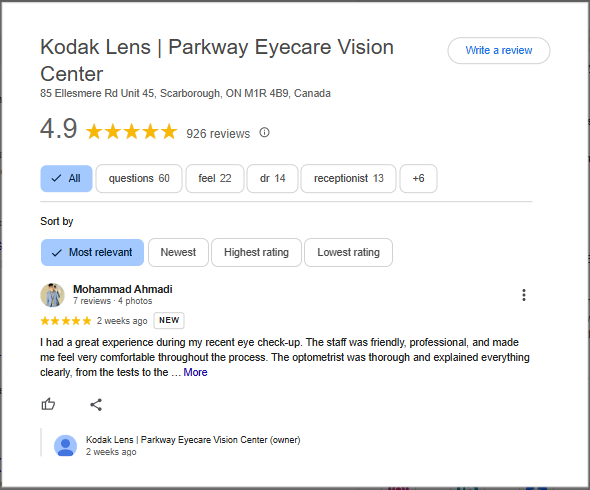
Online reviews can make a big difference in the medical industry. Encourage happy patients to share their experiences on your Google My Business profile. And don’t forget to respond to all Google Reviews – both positive and negative – professionally and with care.
Pro Tip:
As we’ve seen, your Google My Business profile is a powerful tool for attracting new patients. Need help optimizing it? An experienced SEO agency can manage your profile and free up your time to focus on providing exceptional care.
Healthcare content strategy
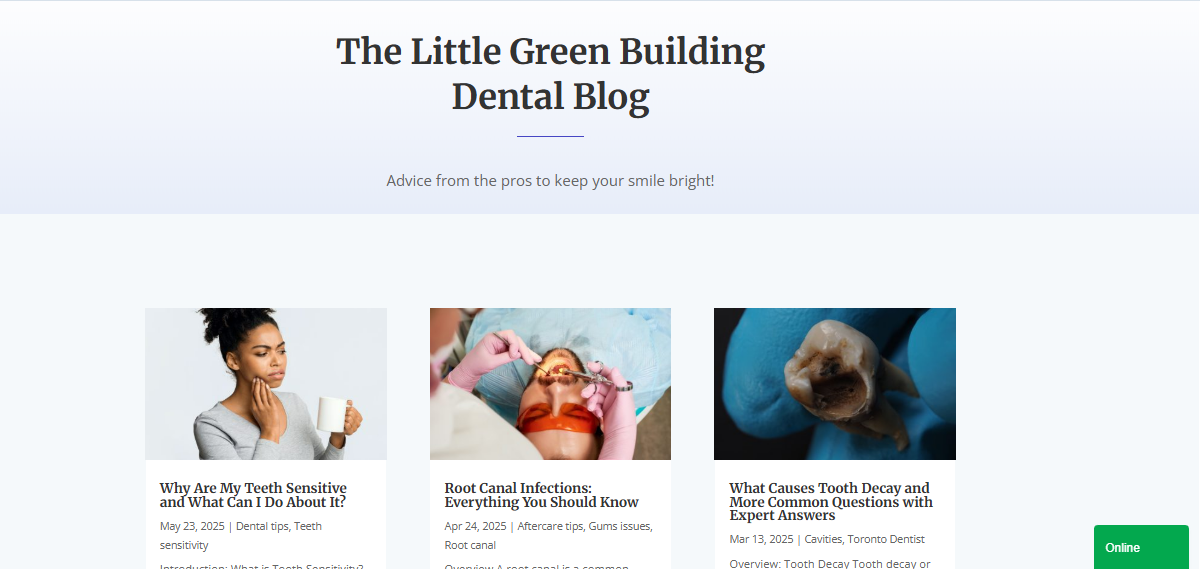
A strong content strategy is how you build trust, and establish your expertise. To get started, focus on creating high-quality content that addresses the needs of your target audience.
What are their concerns? What information are they searching for?
Here are a few ideas to get your content creation flowing:
1 – Healthcare Blog: A blog is a great way to share informative articles and health tips. Write about common conditions you treat or tips for staying healthy.
2 – Email Marketing: Use personalized emails to keep patients engaged. HIPAA-compliant appointment reminders and newsletters with valuable health information all help maintain patient engagement while protecting data privacy.
3 – Social Media Content: Share engaging content on platforms like Instagram and LinkedIn. 68% of healthcare marketers in the U.S. use sponsored Instagram posts to engage patients, and 57% use LinkedIn.
4 – Video and Podcasts: Video content and podcasts are excellent for explaining complex healthcare topics. Hospitals like Massachusetts General Hospital use videos to introduce their staff, explain treatments, and build trust.
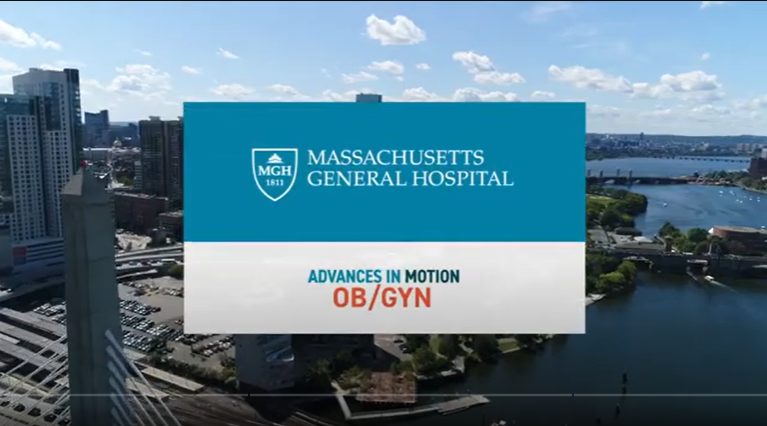
(Source)
5 – Interactive Content: Keep patients engaged with interactive tools. Offering online tools for patients to check symptoms encourages further interaction.
6 – Google’s Rules: E-E-A-T and YMYL
For healthcare content, Google applies both YMYL (Your Money or Your Life) and E-E-A-T (Experience, Expertise, Authoritativeness, and Trustworthiness) guidelines. Healthcare content falls under YMYL because it directly impacts users’ lives.

To rank well, your content needs to meet the highest standards of E-E-A-T, ensuring that information is credible and written or reviewed by qualified medical experts.
7 – Organizing Your Content
As you create more content, consider organizing it into Content Hubs. This makes it easier for patients to find the information they need and helps search engine algorithms understand the structure and relevant content of your website.
By creating a solid content plan, you can attract more patients, improve your organic search rankings, and establish your practice as a trusted source of authoritative content.
SEO for medical websites

We’ve already covered a lot of ground in this guide for you, let’s look at the penultimate important piece of this digital strategy. You need a website that ranks high in search results, attracts visitors, and converts them into loyal patients.
That’s where SEO comes in.
Core Web Vitals: The Foundation of a Healthy Website
Google’s Core Web Vitals are key for a positive user experience and directly impact your search ranking. For your healthcare practice, this means ensuring your website loads quickly (aim for a load time of under 2.5 seconds) and responds promptly to user interactions.
Google’s AI Update: Don’t Risk Your Reputation

Google is cracking down on websites that use AI-generated content to game the system. They’re particularly concerned about sites that host low-quality, AI-generated content.
Let’s say you’re a respected dental clinic. You might be tempted to use AI to pump out articles on various dental procedures.
But if that content is full of errors or lacks a human touch, it could damage your reputation and your search ranking. Google sees this as “Site Reputation Abuse,” and it can get you penalized.
Keywords and Internal Linking: Guiding Patients Through Your Website
As we’ve seen, keywords are a major pillar of SEO. Using the right keywords throughout your website helps search engines understand what your site is about and who it’s for. But don’t forget about internal links. These are the connections between different pages within your website.
For example, if you have a page about pediatric dentistry, you could link to related pages about children’s dental hygiene, common childhood dental issues, or tips for preventing tooth decay in children.
Local SEO for healthcare

Over 46% of all Google searches are local. This means optimizing your website for location-based keywords is essential. For example, instead of just “cardiology clinic,” use “cardiology clinic in [your city/region].”

Building local citations on platforms like Yelp, and Bing Places and the aforementioned Google My Business is a must-do for healthcare providers. These citations not only improve your local search visibility but also provide valuable backlinks to your website.
Voice Search
Patients are increasingly using voice search to find local healthcare providers. Optimize your website for natural language queries like “Where can I find a dermatologist near me?” or “Mental health services in [your city].”
Finally, let’s look a something very technical – but very important – for your website:
Schema Markup for Local SEO in Healthcare:
- LocalBusiness Schema: This schema type is fundamental for local SEO. It marks up essential business details like the healthcare provider’s name, address, phone number (NAP), opening hours, and geo-coordinates.
- Service-Specific Schema: Healthcare providers can also use specialized schema types like Medical Organization or Physician to define specific medical services offered.
- Review and Rating Schema: Including schema for patient reviews and ratings increases the chances of showing rich snippets in search results.
Key Takeaways
- Healthcare SEO requires a comprehensive strategy across keywords, link building, GMB optimization, content creation, and technical SEO implementation
- 75% consider website design and 90% use reviews for healthcare decisions, emphasizing digital presence importance
- Local SEO is a must – with 46% of searches being local. Optimize GMB profiles and implement proper schema markup
- Content must follow E-E-A-T and YMYL guidelines while maintaining HIPAA compliance
- Strategic link-building through medical directories, professional associations, and healthcare bloggers builds authority
Looking for healthcare SEO consultants
Think of your website’s SEO as an essential piece of medical equipment – it needs to be properly calibrated and maintained to function properly.
At Nomadic Advertising, we’re the technicians who can fine-tune your online presence and ensure it’s working optimally to attract new patients.
Ready to get your website in top shape? Book a free 30-minute consultation with our team today.





